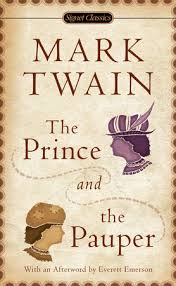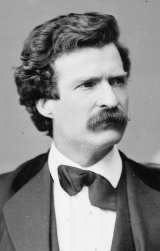The Prince and the Pauper Page #4
The Prince and the Pauper is a novel by American author Mark Twain. It was first published in 1881 in Canada, before its 1882 publication in the United States. The novel represents Twain's first attempt at historical fiction.
“Yes; but it is a slight thing, and your worship knoweth that the poor man-at-arms--” “Peace! It was a shameful thing and a cruel!” cried the little prince, stamping his bare foot. “If the King--Stir not a step till I come again! It is a command!” In a moment he had snatched up and put away an article of national importance that lay upon a table, and was out at the door and flying through the palace grounds in his bannered rags, with a hot face and glowing eyes. As soon as he reached the great gate, he seized the bars, and tried to shake them, shouting-- “Open! Unbar the gates!” The soldier that had maltreated Tom obeyed promptly; and as the prince burst through the portal, half-smothered with royal wrath, the soldier fetched him a sounding box on the ear that sent him whirling to the roadway, and said-- “Take that, thou beggar’s spawn, for what thou got’st me from his Highness!” The crowd roared with laughter. The prince picked himself out of the mud, and made fiercely at the sentry, shouting-- “I am the Prince of Wales, my person is sacred; and thou shalt hang for laying thy hand upon me!” The soldier brought his halberd to a present-arms and said mockingly-- “I salute your gracious Highness.” Then angrily--“Be off, thou crazy rubbish!” Here the jeering crowd closed round the poor little prince, and hustled him far down the road, hooting him, and shouting-- “Way for his Royal Highness! Way for the Prince of Wales!” CHAPTER IV. The Prince’s troubles begin. After hours of persistent pursuit and persecution, the little prince was at last deserted by the rabble and left to himself. As long as he had been able to rage against the mob, and threaten it royally, and royally utter commands that were good stuff to laugh at, he was very entertaining; but when weariness finally forced him to be silent, he was no longer of use to his tormentors, and they sought amusement elsewhere. He looked about him, now, but could not recognise the locality. He was within the city of London--that was all he knew. He moved on, aimlessly, and in a little while the houses thinned, and the passers-by were infrequent. He bathed his bleeding feet in the brook which flowed then where Farringdon Street now is; rested a few moments, then passed on, and presently came upon a great space with only a few scattered houses in it, and a prodigious church. He recognised this church. Scaffoldings were about, everywhere, and swarms of workmen; for it was undergoing elaborate repairs. The prince took heart at once--he felt that his troubles were at an end, now. He said to himself, “It is the ancient Grey Friars’ Church, which the king my father hath taken from the monks and given for a home for ever for poor and forsaken children, and new-named it Christ’s Church. Right gladly will they serve the son of him who hath done so generously by them--and the more that that son is himself as poor and as forlorn as any that be sheltered here this day, or ever shall be.” He was soon in the midst of a crowd of boys who were running, jumping, playing at ball and leap-frog, and otherwise disporting themselves, and right noisily, too. They were all dressed alike, and in the fashion which in that day prevailed among serving-men and ‘prentices{1}--that is to say, each had on the crown of his head a flat black cap about the size of a saucer, which was not useful as a covering, it being of such scanty dimensions, neither was it ornamental; from beneath it the hair fell, unparted, to the middle of the forehead, and was cropped straight around; a clerical band at the neck; a blue gown that fitted closely and hung as low as the knees or lower; full sleeves; a broad red belt; bright yellow stockings, gartered above the knees; low shoes with large metal buckles. It was a sufficiently ugly costume. The boys stopped their play and flocked about the prince, who said with native dignity-- “Good lads, say to your master that Edward Prince of Wales desireth speech with him.” A great shout went up at this, and one rude fellow said-- “Marry, art thou his grace’s messenger, beggar?” The prince’s face flushed with anger, and his ready hand flew to his hip, but there was nothing there. There was a storm of laughter, and one boy said-- “Didst mark that? He fancied he had a sword--belike he is the prince himself.” This sally brought more laughter. Poor Edward drew himself up proudly and said-- “I am the prince; and it ill beseemeth you that feed upon the king my father’s bounty to use me so.” This was vastly enjoyed, as the laughter testified. The youth who had first spoken, shouted to his comrades-- “Ho, swine, slaves, pensioners of his grace’s princely father, where be your manners? Down on your marrow bones, all of ye, and do reverence to his kingly port and royal rags!” With boisterous mirth they dropped upon their knees in a body and did mock homage to their prey. The prince spurned the nearest boy with his foot, and said fiercely-- “Take thou that, till the morrow come and I build thee a gibbet!” Ah, but this was not a joke--this was going beyond fun. The laughter ceased on the instant, and fury took its place. A dozen shouted-- “Hale him forth! To the horse-pond, to the horse-pond! Where be the dogs? Ho, there, Lion! ho, Fangs!” Then followed such a thing as England had never seen before--the sacred person of the heir to the throne rudely buffeted by plebeian hands, and set upon and torn by dogs. As night drew to a close that day, the prince found himself far down in the close-built portion of the city. His body was bruised, his hands were bleeding, and his rags were all besmirched with mud. He wandered on and on, and grew more and more bewildered, and so tired and faint he could hardly drag one foot after the other. He had ceased to ask questions of anyone, since they brought him only insult instead of information. He kept muttering to himself, “Offal Court--that is the name; if I can but find it before my strength is wholly spent and I drop, then am I saved--for his people will take me to the palace and prove that I am none of theirs, but the true prince, and I shall have mine own again.” And now and then his mind reverted to his treatment by those rude Christ’s Hospital boys, and he said, “When I am king, they shall not have bread and shelter only, but also teachings out of books; for a full belly is little worth where the mind is starved, and the heart. I will keep this diligently in my remembrance, that this day’s lesson be not lost upon me, and my people suffer thereby; for learning softeneth the heart and breedeth gentleness and charity.” {1} The lights began to twinkle, it came on to rain, the wind rose, and a raw and gusty night set in. The houseless prince, the homeless heir to the throne of England, still moved on, drifting deeper into the maze of squalid alleys where the swarming hives of poverty and misery were massed together.
Translation
Translate and read this book in other languages:
Select another language:
- - Select -
- 简体中文 (Chinese - Simplified)
- 繁體中文 (Chinese - Traditional)
- Español (Spanish)
- Esperanto (Esperanto)
- 日本語 (Japanese)
- Português (Portuguese)
- Deutsch (German)
- العربية (Arabic)
- Français (French)
- Русский (Russian)
- ಕನ್ನಡ (Kannada)
- 한국어 (Korean)
- עברית (Hebrew)
- Gaeilge (Irish)
- Українська (Ukrainian)
- اردو (Urdu)
- Magyar (Hungarian)
- मानक हिन्दी (Hindi)
- Indonesia (Indonesian)
- Italiano (Italian)
- தமிழ் (Tamil)
- Türkçe (Turkish)
- తెలుగు (Telugu)
- ภาษาไทย (Thai)
- Tiếng Việt (Vietnamese)
- Čeština (Czech)
- Polski (Polish)
- Bahasa Indonesia (Indonesian)
- Românește (Romanian)
- Nederlands (Dutch)
- Ελληνικά (Greek)
- Latinum (Latin)
- Svenska (Swedish)
- Dansk (Danish)
- Suomi (Finnish)
- فارسی (Persian)
- ייִדיש (Yiddish)
- հայերեն (Armenian)
- Norsk (Norwegian)
- English (English)
Citation
Use the citation below to add this book to your bibliography:
Style:MLAChicagoAPA
"The Prince and the Pauper Books." Literature.com. STANDS4 LLC, 2025. Web. 5 Feb. 2025. <https://www.literature.com/book/the_prince_and_the_pauper_315>.








Discuss this The Prince and the Pauper book with the community:
Report Comment
We're doing our best to make sure our content is useful, accurate and safe.
If by any chance you spot an inappropriate comment while navigating through our website please use this form to let us know, and we'll take care of it shortly.
Attachment
You need to be logged in to favorite.
Log In